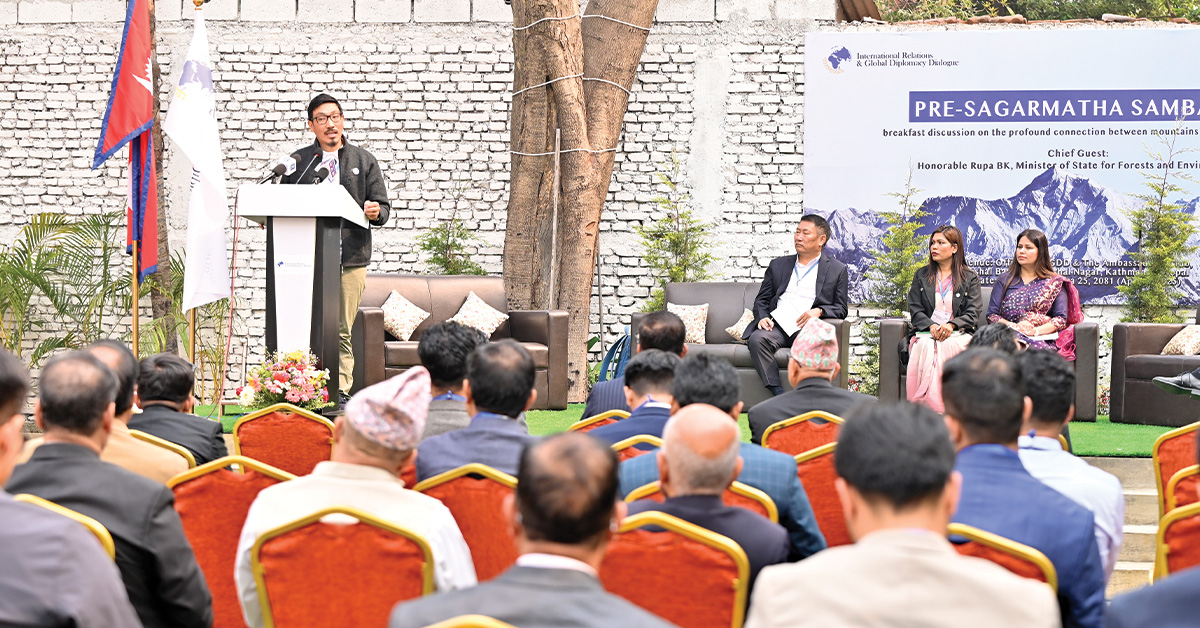
The International Relations and Global Diplomacy Dialogue (IRGDD), in collaboration with the Government of Nepal, organized the Pre-Sagarmatha Sambaad on April 7, 2025. The dialogue focused on the impact of climate change on the Himalayas, and its far-reaching consequences for humanity. State Minister for Forests and Environment Rupa B.K. attended the dialogue as the chief guest.
Sagarmatha Sambaad is a multi-stakeholder dialogue forum committed to deliberating on prominent issues of global, regional, and national significance. It is being hosted for the first time by the Government of Nepal from May 16 to 18, 2025. The Pre-Sagarmatha Sambaad, organized by IRGDD, served as a preliminary intellectual forum to raise awareness and set the stage for the forthcoming main event.
The program commenced with a welcome address by IRGDD President and former Ambassador Dr. Sarmila Parajuli Dhakal. A panel of distinguished speakers representing climate and other sectors shared their insights during the event.
The panel of speakers included Dr. Pema Gyamtsho, Director General of the International Centre for Integrated Mountain Development (ICIMOD), which works on behalf of the people of the Hindu Kush Himalayas; Dr. Popular Gentle, former climate advisor to the Prime Minister, Madhu Marasani, former Finance Secretary; Dawa Tashi Sherpa, renowned mountaineer and Everest summiteer; Chandi Raj Dhakal, former President of the Federation of Nepalese Chambers of Commerce and Industry and Vice President of the SAARC Chamber of Commerce and Industry; and Dr. Biraj Singh Thapa, assistant professor and team leader at the Green Hydrogen Lab.
State Minister B.K. underscored the “Triple Environment crisis” confronting the world: climate change, biodiversity loss, and pollution. “While they may seem different, they are all underlinked,” she noted, adding that Nepal remains among the most vulnerable countries to climate change, and the government is working to address these challenges.

Elaborating on the objectives of Sagarmatha Sambaad, she stated, “It is not just a dialogue—it’s a global initiative.” She highlighted that the forum lays the groundwork for climate diplomacy, aiming not only to protect nature but also to support communities with minimal carbon emissions. “Sagarmatha Sambaad should bring justice to people who are on the frontlines of protecting our environment,” she affirmed.
President Dhakal opened her address by highlighting that the Pre-Sagarmatha Sambaad is a call to unite science, diplomacy, and action, expressing pride in hosting the dialogue to highlight the intrinsic link between the Himalayas and humanity. She affirmed IRGDD’s belief in strong diplomatic efforts for change.

“Today’s discussion has once again emphasized an undeniable truth: the climate crisis is a Himalayan crisis. And there must be global discourse centering the Himalayas in climate discussions,” President Dhakal added. She also announced that the IRGDD would host three additional virtual dialogue sessions as part of the Pre-Sagarmatha series.
Dr. Pema Gyamtsho, Director General of ICIMOD, remarked that it is time for the people of the Himalayas to give back to nature, urging the Sagarmatha Sambaad to centre its focus on what contributions can be made to nature. “Black carbon is covering the snow. The mountains will continue to suffer for a few more years,” he noted, emphasizing the need to focus on carbon finance and reminding that climate change has no borders.

Likewise, Dr. Popular Gentle pointed out the absence of a permanent negotiation team in Nepal to represent the country in international climate forums. “There are not enough experts from multiple sectors,” he remarked, adding that experts need to speak up on climate issues, which is also a youth agenda. Highlighting the fact that mountains provide services worldwide, he called for the need to engage major international organizations to attract more funding to support our cause.

Former Finance Secretary Marasini noted that the Sagarmatha Sambaad holds potential as an important platform for international dialogue and debate for Nepal. He emphasized the relevance of the ongoing fiscal year’s focus on climate change, revealing that 6% of the federal budget has already been allocated for climate-related efforts. “The goal is to increase this to 20% by the 2085–86 fiscal year,” he added, while cautioning against overreliance on donor agencies, which currently contribute less than 20% of the climate budget.

Mountaineer Dawa Tashi Sherpa, who is also an Everest summiteer, remarked that the melting of the Himalayan snow is not primarily due to population pressure but rather the pursuit of luxury-lifestyles in the region. “Protecting the mountains requires everyone’s effort. Local communities alone cannot safeguard the Himalayas,” he said, sharing his mountaineering experiences during the event.
Chandi Raj Dhakal noted that the IRGDD’s Pre-Sagarmatha Sambaad would meaningfully support the Government of Nepal’s forthcoming event Sagarmatha Sambaad. “Our institution (SAARC Chamber of Commerce and Industry) is also ready to collaborate with IRGDD,” he stated.

Dr. Biraj Singh Thapa pointed out that Nepal spends NPR 400 billion annually on fuel imports, while the country’s resources could help Nepal and neighbouring countries reduce fuel dependency. Stating that cement factories that are currently reliant on fossil fuels could transition to hydrogen, he urged the government to take decisive action. “The lack of policy should not be an excuse. Necessary policies must be introduced,” he said.

Closing the event, IRGDD President Dr Parajuli called on attendees to pledge a renewed commitment to action. She stated that the key recommendations emerging from the Pre-Sagarmatha would be forwarded to the Sagarmatha Sambaad committee for deliberation at the main summit.